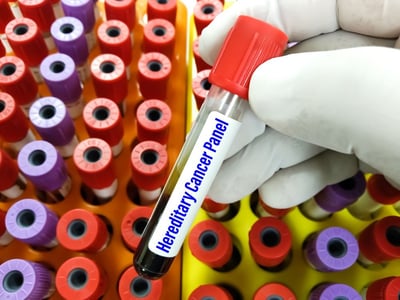Breast Cancer



Relevance: Medium-High
Most relevant for: People interested in the use of artificial intelligence in medicine
Article: Artificial intelligence (AI) may find breast cancer on mammograms sooner
Artificial intelligence (AI) tools may help doctors read mammograms. This assistance may lead to earlier diagnoses of breast cancer. (Posted 9/29/23)
Este artículo está disponible en español.
READ MORE ›


Relevance: High
Most relevant for: People interested in genetic testing.
Article: Genetic testing and the future of medicine
An article published in Katie Couric Media discusses genetic testing and how it can impact health. The author talked with Dr. Robert Steiner, a doctor who specializes in genetics. He talked about genetic testing and how the results can affect health and change lives. (Posted 9/28/23)
Este artículo está disponible en español.
READ MORE ›


Relevance: Medium-Low
Most relevant for: People with solid tumors.
Article: Promising drug for cancer treatment begins clinical trials
Researchers at City of Hope are testing a new type of cancer treatment drug. When tested in animals and cells taken from human cancers, this new drug prevented the growth of many types of cancer. Initial clinical trials in people have just started. (Posted 9/7/23)
Este artículo está disponible en español.
READ MORE ›


Relevance: Medium-High
Most relevant for: People with breast cancer or metastatic breast cancer in sexual or intimate relationships and their partners
Topic: Sex and intimacy after breast cancer
A breast cancer diagnosis and treatment can affect relationships with romantic partners. This review highlights two studies that looked at how people with breast cancer and their partners are affected, how they cope, how best to communicate with each other and how to talk with healthcare providers about concerns related to cancer and sexuality. (Posted 8/8/23)
Este artículo está disponible en español.
READ MORE ›


Relevance: Medium-High
Most relevant for: People who are using or have recently used birth control containing only the hormone progestin
Study: Progestin birth control may slightly increase breast cancer risk
Different types of birth control carry different cancer risks. Birth control using the hormone progestin slightly increases the risk of breast cancer during use and for a few years after use. (Posted 7/10/23)
Este artículo está disponible en español.
READ MORE ›


Relevance: Medium-High
Most relevant for: People belonging to the LGBTQ+ community
Study: Breast cancer disparities among the LGBTQ+ community
This study looked at differences in breast cancer treatment outcomes among people from the LGBTQ+ community. (Posted 6/28/23)
Este artículo está disponible en español.
READ MORE ›


Relevance: Medium-High
Most relevant for: People who have mammograms
Guideline: What is breast density and why does it matter?
New FDA guidelines for mammograms will go into effect by September 2024. Current FDA guidance requires hospitals and breast centers to give people information about their breast density with their mammogram results. By September 2024, mammogram providers will need to relay to patients who have dense breast that they should discuss the need for additional imaging. This article provides an overview of what breast density means and why it matters. (Posted 6/8/23)
Este artículo está disponible en español.
READ MORE ›


Relevance: Medium
Most relevant for: People who have cancer who are pregnant
Topic: Impact of new laws on cancer treatment during pregnancy
The U.S. Supreme Court ruled in 2022 that abortion is no longer a protected right under the Constitution. This landmark decision leaves regulation of abortion to the states. Cancer treatment during pregnancy may now be impacted in states that have abortion bans or limitations. (Posted 5/31/23)
Este artículo está disponible en español.
READ MORE ›


Relevance: High
Most relevant for: People with a CDH1 mutation or a family history of stomach cancer
Article: A food lover’s decision to remove her stomach highlights difficult decisions around cancer risk
National Public Radio reporter Sáša Woodruff shares her story of learning about her CDH1 mutation and making a decision about risk-reducing surgery. Mutations in the CDH1 gene significantly increase a person’s risk of stomach and breast cancers. Woodruff’s personal essay describes the psychological challenge of making decisions about risk-reducing surgeries and draws attention to a lesser-known mutation linked to hereditary cancer. (Posted 5/17/23)
Este artículo está disponible en español.
READ MORE ›


Relevance: High
Most relevant for: People with HR-positive HER2-negative advanced breast cancer
Study: Breast cancer outcomes improved with CDK4/6 inhibitor treatment
A study showed that people with metastatic breast cancer who took an oral drug known as a CDK4/6 inhibitor combined with hormone therapy did better than people who took hormone therapy alone. The drug combination improved the length of time before cancer worsened or returned. After six years of treatment, people who took this drug combination lived longer compared to those who took hormone therapy alone. (Posted 4/5/23)
Este artículo está disponible en español.
READ MORE ›